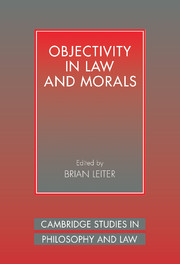Book contents
- Frontmatter
- Contents
- Contributors
- Acknowledgments
- Introduction
- 1 Legal Interpretation, Objectivity, and Morality
- 2 Objectivity, Morality, and Adjudication
- 3 Objectivity Fit for Law
- 4 Objective Values: Does Metaethics Rest on a Mistake?
- 5 Notes on Value and Objectivity
- 6 Embracing Objectivity in Ethics
- 7 Pathetic Ethics
- Bibliography
- Index
1 - Legal Interpretation, Objectivity, and Morality
Published online by Cambridge University Press: 06 October 2009
- Frontmatter
- Contents
- Contributors
- Acknowledgments
- Introduction
- 1 Legal Interpretation, Objectivity, and Morality
- 2 Objectivity, Morality, and Adjudication
- 3 Objectivity Fit for Law
- 4 Objective Values: Does Metaethics Rest on a Mistake?
- 5 Notes on Value and Objectivity
- 6 Embracing Objectivity in Ethics
- 7 Pathetic Ethics
- Bibliography
- Index
Summary
Much of traditional analytical jurisprudence concerns the nature of law and the relation between law and morality. One traditional debate about the nature of law concerns its objectivity or determinacy. A conception of law can be understood to be objective insofar as it represents the law in actual or hypothetical controversies as determining a uniquely correct outcome; it can be understood as skeptical insofar as it represents the law as indeterminate. Extreme skepticism would claim that the law is rarely, if ever, determinate, whereas complete objectivity would claim that the law is never indeterminate. By contrast, a more moderate skepticism maintains that the law is indeterminate when it is especially controversial what the law requires. Here, as elsewhere, extreme views may be difficult to accept. Few endorse complete objectivity; some strands in Legal Realism and in Critical Legal Studies appear to endorse extreme skepticism about the law; but moderate skepticism is probably the view more congenial to common sense.
Another traditional jurisprudential debate concerns the relation between law and morality. This debate is often cast between Legal Positivism and Natural Law. Whereas Natural Law theory asserts that there is some essential connection between law and morality, Legal Positivism denies this. In particular, Natural Law theory typically asserts that valid laws must have some significant moral content, without which they are not genuine legal norms.
- Type
- Chapter
- Information
- Objectivity in Law and Morals , pp. 12 - 65Publisher: Cambridge University PressPrint publication year: 2000
- 4
- Cited by



